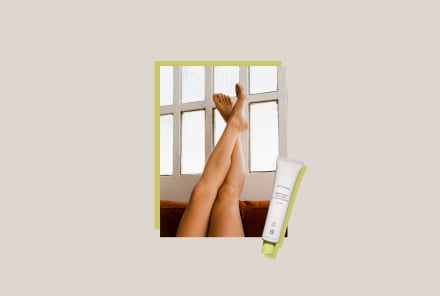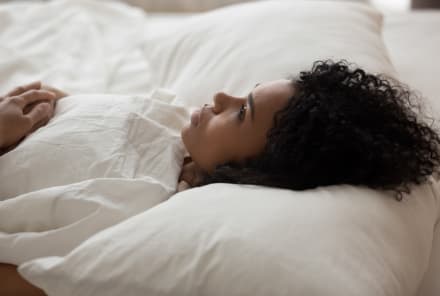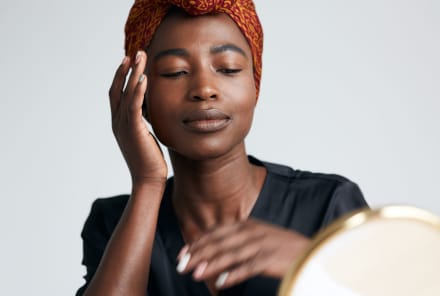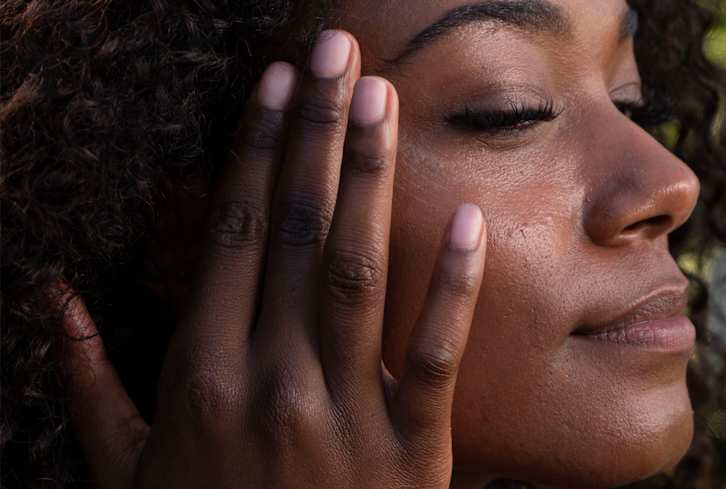Advertisement
How Your Lips Can Lose Color + 6 Tips To Keep Them Vibrant, From Derms

Your poor lips go through a lot over time. The delicate skin is one of the thinnest on your face (apart from the fragile eye area), so it's quick to betray dehydration (ahem, cracks and flakes), and it's one of the first areas to reveal signs of aging. With the latter, you may know that the lips lose volume and become thinner over time—we've certainly waxed poetic on the topic—but did you know your lips can lose their color, too?
Yep, your lips become less vibrant as you age. Don't panic, though: It's totally natural. But if it bothers you, there are some ways you can hold on to the rosy hue.
How do your lips lose color?
First, a little lip anatomy: Your lips are composed of two parts—the cutaneous lip and the mucosal lip, which includes the vermilion (aka, what's responsible for the different shade of pigment on your lips compared to the rest of the face).
"The mucosal part of your lip is thinner compared to the rest of your skin, as it is made up of fewer layers and also contains many capillaries or tiny blood vessels," says board-certified dermatologist Marisa Garshick, M.D., FAAD. "Taken together, this accounts for the color of the lips." Essentially: The skin on your lips is super thin and delicate, which makes the underlying blood vessels more noticeable.
Of course, everyone has a different lip pigment: Lips come in all shapes, sizes, and colors, all of them equally stunning and unique. (And for what it's worth, many people can have two-tone lips as well.) No matter your specific lip color, though, it does tend to be most vibrant when you're young, fading over time.
"As you get older, the lips tend to thin and [face] increased moisture loss, causing the lips to dry out, which may change the overall appearance and color, as having dry skin on the lips can make them appear dull," says Garshick. Since the colored part of your lips is already so thin (told you that anatomy lesson would come in handy!), you might notice these changes, both in volume and pigment, much quicker.
That said, it seems duller lips are only a matter of time. However, a few factors can speed up those pigmentary changes:
- UV damage: "The sun can dry out the lips and compromise the lips' ability to hold water and hydration," Michelle Henry, M.D., founder of Skin & Aesthetics Surgery of Manhattan, previously shared with mbg. And, well, drier lips tend to lose their color much faster. Not to mention, sun exposure also contributes to collagen decline, which can accelerate lip thinning and discoloration over time. One study exposed collagen to UV light and found that there was a "significant decrease" in collagen structure afterward1.
- Smoking: "Smoking decreases the amount of oxygen delivered to tissues. Therefore, tissue cannot regenerate and is more likely to become damaged and die," board-certified dermatologist Gary Goldenberg, M.D., assistant clinical professor of dermatology at the Icahn School of Medicine at Mount Sinai in New York tells us about aging lips.
- Vitamin deficiencies: Some vitamin gaps have been associated with dry, pale lips, such as folate2, B63, B124, and B25 (aka riboflavin). An iron gap has also been linked to a dry, chapped pout—which makes sense, given the mineral's ability to support healing processes6.* Zinc is important for healthy skin as well,* and a lack of it has been associated with dryness around the mouth7.
What to do about it.
While your lips naturally become duller over time, there are a few things you can do to keep them bright and supple:
Keep your lips hydrated.
Says Garshick, hydrated, happy lips look more vibrant—all the more reason to save your raw, cracked. Make sure you're correctly moisturizing your pout year round, and look for balms that contain humectants (as opposed to occlusive-only salves that simply sit on top of the skin).
"Humectants are basically 'water magnets,'" board-certified dermatologist Ava Shamban, M.D., founder of SKINFIVE, tells mbg about the ingredient category. "Think of the skin as an actual sponge. When it is dry, it is thin, brittle, not pliable, rough in texture, dull, and sallow in color. Run it under water, and it is instantly plump, dense, and smooth. Even the color is brighter." This rings true for your overall complexion and the thin skin on your lips. In addition to those lovely humectants, make sure your balm folds in some emollients and occlusives, too, to soften microcracks and make sure all that moisture stays locked inside.
You may also want to slap on a soothing lip mask, if you so choose; friendly reminder that the skin is more permeable at night8, so applying a mask packed with nourishing actives can help you wake up to baby-smooth lips.
Protect them from the sun.
"Protecting your lips from the sun is just as important as protecting your face," says aesthetic nurse practitioner Shawna Jones, PA-C, about how to keep your lips plump and supple. "Look for products that have a physical sunblock [like titanium dioxide and zinc oxide]. Some also contain other moisturizing actives, like hyaluronic acid, to hydrate and smooth the lips." Find our favorite SPF lip balms here, and try to shield them from baking under those rays—after all, optimal sun care takes more than swiping on a balm.
Support collagen production.
Lip thinning and loss of color happen hand-in-hand, and lips tend to deflate as your collagen structure weakens. Collagen loss happens naturally over time, but there are ways you can support your internal levels—like hydrolyzed collagen supplements. These have been shown to maintain dermal thickness, support elasticity, and natural moisture levels9, all of which can help maintain a more vibrant color for longer. Check out our favorite collagen supplements here.
Use lip plumper.
Many lip plumping formulas rely on spicy, heat-inducing essential oils (like cinnamon oil or cayenne) to stimulate your blood vessels and cause them to expand, which helps the blood underneath (aka, what’s responsible for your lip color) become more noticeable. This isn’t a long-term fix, as many lip-plumping ingredients can dry out the lips over time, but stimulating your lips can enhance their appearance immediately. Find our favorite lip plumpers here.
Wear lip color.
At the end of the day, you cannot delay age. With time, your lips may appear less rosy than they did when you were young—that's natural and OK! If it bothers you, however, you can always rock a bold, red lip or find your favorite "my lip, but better" balm in your exact shade (or, rather, the youthful-looking shade you're after) to add some color back to your pout. Clean options typically come loaded with hydrating ingredients as well, so you're effectively piling on moisture at the same time—which, we noted above, can help your lips look plumper and more vibrant.
See a derm.
If you notice these pigmentary changes quite suddenly or are concerned about any vitamin deficiencies, it’s always a good idea to see a derm to get to the root of the issue. If you think you might be dealing with a nutritional gap, "add a supplement or multivitamin after speaking with your doctor," suggests Ife J. Rodney, M.D., FAAD, founding director of Eternal Dermatology + Aesthetics.
The takeaway.
Your lips lose pigment as you age, for the same reasons they may become thinner—with a loss of collagen and moisture, they appear less vibrant. It's a natural part of aging, but there are some ways to make sure you're not accelerating the process.
9 Sources
- https://www.ncbi.nlm.nih.gov/pmc/articles/PMC3299808/
- https://www.thelancet.com/journals/lancet/article/PIIS0140-6736(71)92626-2/fulltext
- https://www.ncbi.nlm.nih.gov/books/NBK470579/
- https://www.ncbi.nlm.nih.gov/books/NBK536929/
- https://www.ncbi.nlm.nih.gov/books/NBK525977/
- https://www.ncbi.nlm.nih.gov/pmc/articles/PMC4091310/
- https://www.ncbi.nlm.nih.gov/books/NBK493231/
- https://www.ncbi.nlm.nih.gov/pmc/articles/PMC4926335/
- https://jddonline.com/articles/dermatology/S1545961619P0009X


















